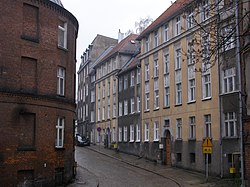Biskupia Górka
Biskupia Górka (German: Bischofsberg, sometimes Bischofshügel) is a part of the city of Gdańsk in Poland. Historically, Biskupia Górka had important strategic meaning, since it is a hill close to the main city.
Biskupia Górka | |
|---|---|
Neighbourhood of Gdańsk | |
 Biskupia Street in Biskupia Górka | |
 Location of Biskupia Górka within Śródmieście, Gdańsk | |
| Country | |
| Voivodeship | Pomeranian |
| County/City | Gdańsk |
| District | Śródmieście |
| Time zone | UTC+1 (CET) |
| • Summer (DST) | UTC+2 (CEST) |
As part of the Crown of the Kingdom of Poland it was a private church village of the Roman Catholic Diocese of Włocławek, administratively located in the Gdańsk County in the Pomeranian Voivodeship.[1]
On July 4, 1946, eleven guards of the Stutthof concentration camp were publicly hanged for what was described as "sadistic abuse of prisoners." Among those hanged were five women: Gerda Steinhoff, Wanda Klaff, Jenny-Wanda Barkmann, Ewa Paradies and Elisabeth Becker, all of whom had been judged and sentenced during the first Stutthof Trial, at Gdańsk between April 25 and May 31, 1946.
The former Mennonite church is located in Biskupia Górka.
See also
- Gdańsk Biskupia Górka (train station)
- Stutthof trials
| Wikimedia Commons has media related to Biskupia Górka. |
References
- Marian Biskup, Andrzej Tomczak, Mapy województwa pomorskiego w drugiej połowie XVI w., Toruń, 1955, p. 91 (in Polish)
About the execution (in German){date=January 2015}